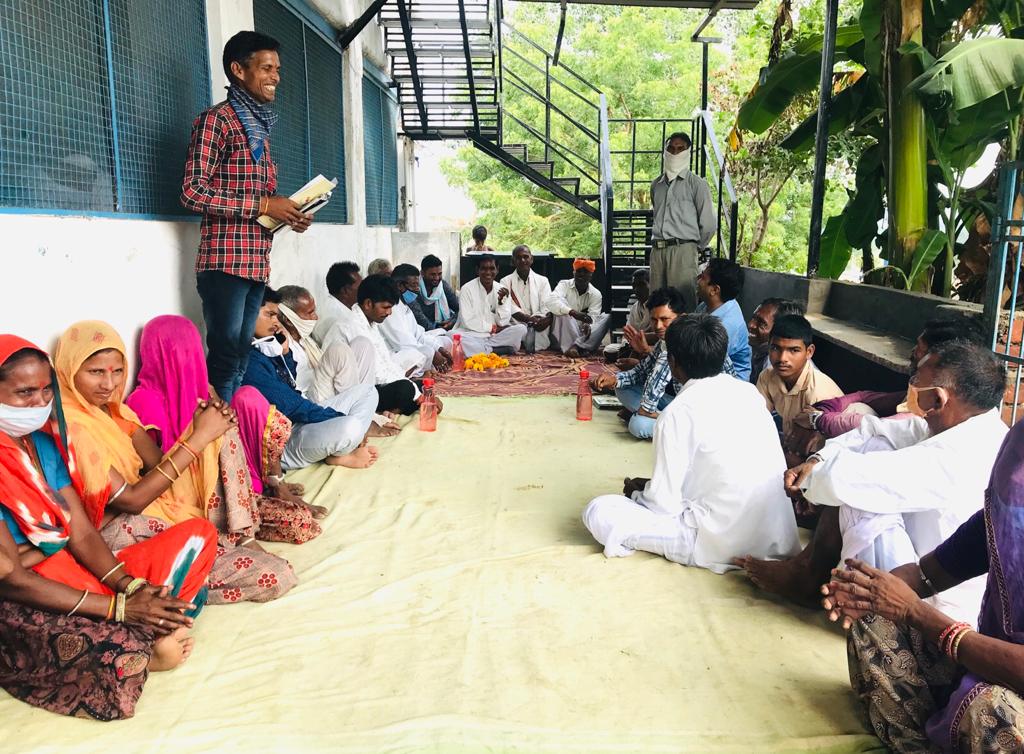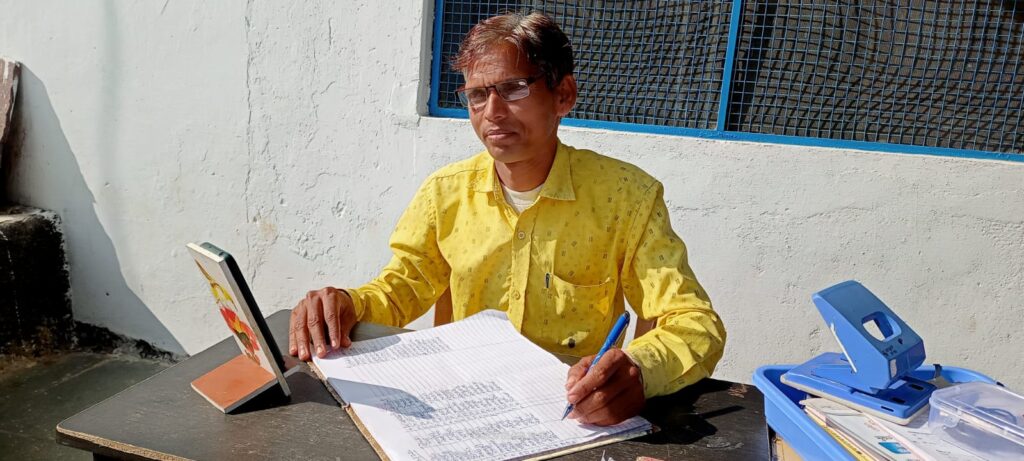
My attention was drawn to Ramlal’s eyes. One, because they are yellow-green, a rather unusual shade. Two, because they soon turned red. It was the red of emotion, the emotion of anguish, the anguish of the subaltern, the subaltern of Manpur, the Manpur of Salumbar, two hours away from Udaipur.
From the outset, this meeting had such a different axis. (Literally too. It took place in the village of Manpur, not too far from the Tropic of Cancer).
Here was a man in sync with his tender side. It seemed to temper his speech which was like fireworks. His expression had josh (Urdu for enthusiasm) which brought me to the other side of that anguish. From yin to yang, Ramlal carried both with ease.
But his anomalies do not end there.
Employment in his village was nearly impossible and wages were not worth the candle. Yet, unlike his male peers who left for the city to survive, Ramlal Meena refused to step out of Manpur, the village of his birth and ancestors. He did not fancy vocational trainings (like cycle repair) in the village either. Worse, he could not study beyond school because among his five siblings, he was the only caregiver to his bed-bound mother. In the five years he spent looking after her, the only other occupation he found worthwhile was listening.
Ramlal would seat himself at the edge of small gatherings – under trees, by hand pumps, at local stores, panchayats – and listen to the narratives of fellow villagers. In their anecdotes of loss and joy, his takeaway was the unnecessary suffering of life, especially of women. Unknown to him then, it became the animating principle for his eventual community-based work.
Till he found such work, he decided to take up part-time gigs.
For example, in 2013, he watched over the construction of Amrit Clinic at Manpur. While at that, he realized that the mission of the clinic matched his own—to serve the community, with values of compassion and human rights. His diligence struck chords, and Ramlal was offered a job. Many an orientation and training later, Ramlal became the Male Health Worker at the clinic.
His dedication helped him speed up many learning curves—he learnt how to drive a motorbike, to talk to women about their health and rights, work with female nurses, engage men in conversations about contraception, question the mandate to have a male child and the neglect of the female child, among others.
Looking back at his forty years, he cherishes the last ten at Amrit Clinic. Zipping through the valleys of Manpur has brought him and the patients to a space of empowered perspectives. There are more and more villagers who visit the clinic and not just the Bhopa (tantric) next door.
Ramlal is himself a milestone of this progress. In his community (like many others in the country), where family assets can only be passed to the male heir and never to the daughter, Ramlal is an exemplar: I have already told my daughters,
| “If you ever face any difficulty in your married life, do not ever think that Papa has sent us away and so we cannot go back to him. You can, always. And each one of you will have the keys to a house of your own”. |
What a rad dad! His eyes went red at the picture of his daughters leaving the nest.
Ramlal invests as much in the education of his daughters as his son, if not more. He also makes up for the life skills and education that schools do not impart:
| Like I do at the clinic, I talk about the importance of hygiene during menstruation and the risks of early marriage and motherhood wherever I go. I check upon my female relatives and talk to neighbours about these matters. |
Prior to his employment at Amrit Clinic, Ramlal had not thought about the custom of menstruating women sleeping outside the house. After his training at work, he asked his wife and daughters to stop any such practice.
This drive to transform seeped into other nooks of his life and those around. When Ramlal heard about an underprivileged family planning to starve a new-born girl to death because she was born with cleft lips, he rushed to rescue her. He gave the mother hope and bought time to plan, organize, and travel for the child’s surgery in Jaipur.

(Sigh. If only there are more such men around us girls and women…).
There are many such incidents that sit behind those yellow-green (red) eyes of Ramlal. He speaks with a sense of urgency, with a wish to quickly tackle what ails his people. Like the deep trauma of generations of women and girls who are humiliated under the guise of witchcraft.
As if in response to his intensity, the four pens in the pocket of his shirt lean far out, ready to write another new story of transformation. His eyes, the symbols of his josh. His pens, of his hosh (Urdu for awareness, attention).
Amrita Nandy
13 March, 2023
